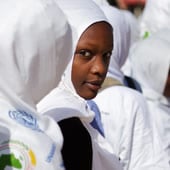The 56th session on the Commission on the Status of Women will begin on Feb. 27 at the United Nations headquarters. The theme – empowerment of rural women and their role in poverty and hunger eradication, sustainable development and current challenges – will be the driving force to bring a change to millions of women worldwide. It is sponsored by UN Women, who celebrated their first year anniversary this month.
UN Women director Michelle Bachelet said in a press release delivered on February 2 that “without women, we cannot have a healthy economy. Yet today more than 800 million women lack the education, training, and opportunities to participate fully in economic life. Unleashing women’s economic potential will make economic growth and recovery faster and more equitable. Economic empowerment makes other rights possible for women.”
According to UN Women, rural women constitute one-fourth of the world’s population. They account for a large proportion of the agricultural workforce. Despite their significant presence, their rights are often overlooked. The commission in late February will review progress and gaps in gender equality, and agree on actions to empower rural women. For example, the UN Women’s website lists the following areas where there are persistent gaps in equality:
- While women have equal property ownership rights in 115 countries and have equal inheritance rights in 93 countries, gender disparities in land holdings persist worldwide.
- Only 5 percent of agricultural extension services are provided for women farmers, and in rural sub-Saharan Africa, women hold less than 10 percent of the credit available to smallholder agriculture.
- Rural women also face more difficulty than men in accessing public services, social protection, employment and markets, due to cultural norms, security issues and lack of identification documents. For instance, recent UN Women research shows that the proportion of women without identification cards is as high as 80 percent in some villages in rural Egypt, which hampers their access to health, education, pensions, application for property title or deed, and other social services in addition to their ability to vote.
- The international community contributed USD 7.5 billion in official development assistance to rural development and the agricultural sector in 2008–2009. However, only 3 percent of the amount was allocated to programmes where gender equality was the main objective.
Poverty is very often a rural problem. Of the 1.4 billion who are considered “extremely poor” in the developing world, over 70% live in rural areas. This is true in developed nations as well; in Canada and the U.S., 14% of the rural population is considered poor. The most vulnerable of those are female-headed households and ethnic minorities.
According to a report by the UN Secretary General, “Empowering rural women and girls is an essential part of the solution to some of today’s most serious global challenges: food security, poverty reduction and sustainable development. Their agency is critical to secure higher rates of agricultural growth and enhanced food security, reduce the intergenerational transmission of poverty and manage land and rural resources in a sustainable manner.”
The week is promising, and will hopefully bring about results instead of more rhetoric. The problems are evident, and the solutions seem plausible. A few notable conversations that will be held include a discussion on non-paid work performed by women (the daily running of the house, which for some women includes a ten-mile walk to fetch water), the situation of Palestinian women, (which includes the violence they face due to civil unrest, and an unemployment rate of 47.8%)3, and ending female genital mutilation.
The council is part of an effort to reach the UN’s Millennium Development Goals.
